Camus Study guides, Class notes & Summaries
Looking for the best study guides, study notes and summaries about Camus? On this page you'll find 93 study documents about Camus.
All 93 results
Sort by
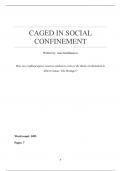
-
Literary analysis - English Literature A Higher Level IB - The Stranger
- Book review • 8 pages • 2023
-
- $17.35
- 1x sold
- + learn more
This is an essay written for the English Literature A Higher Level in the International Baccalaureate Diploma Programme (IBDP). The essay was written in the 1st year of IBDP in 2017 (I graduated in 2018). The document starts with a reflective statement as was required during the course of my studies in 2017/2018. I received the highest score on this essay, and the perfect grade of 7. Thus, you may use this document y as en exemplary work helping guide your writing experience. Best ...
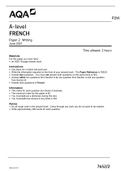
-
AQA A-LEVEL FRENCH 76522 Paper 2 Writing mark scheme june 2021
- Exam (elaborations) • 12 pages • 2022
- Available in package deal
-
- $8.36
- 3x sold
- + learn more
AQA A-LEVEL FRENCH 76522 Paper 2Guy de Maupassant : Boule de Suif et autres contes de la guerre Either 0 3 . 1 Analysez comment la structure du conte Boule de Suif contribue à son succès. [40 marks] or 0 3 . 2 « Maupassant s’intéresse à des gens ordinaires qui se trouvent dans des situations extraordinaires. » En vous référant à au moins deux contes, expliquez si vous êtes d’accord ou pas avec ce jugement. [40 marks] 0 4 Albert Camus : L’étrange Writing mark scheme ju...
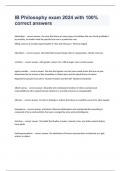
-
IB Philosophy exam 2024 with 100% correct answers
- Exam (elaborations) • 10 pages • 2024
-
- $16.49
- + learn more
Absolutism - correct answer the view that there are some types of activities that are strictly prohibited by morality, no matter what the specific facts are in a particular case. Killing a person is morally impermissible in "War and Massacre" (Thomas Nagel) Absurdism - correct answer the belief that human beings exist in a purposeless, chaotic universe. a fortiori - correct answer with greater reason, for a still stronger more certain reason agent causality - correct answer ...
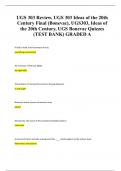
-
UGS 303 Review, UGS 303 Ideas of the 20th Century Final (Bonevac), UGS303, Ideas of the 20th Century, UGS Bonevac Quizzes (TEST BANK) GRADED A
- Exam (elaborations) • 172 pages • 2024
-
- $15.49
- + learn more
If God is dead, Ivan Karamazov insists, everything is permitted An invention of the late 1800s: the light bulb The problem of normativity concerns the gap between is and ought Nietzsche wants science to become more playful Dostoevsky: the vision of the anointed inevitably leads to narcissism A two-level theory includes a deep level that ____ what happens at the surface level. determines and explains Doyle's vision is tragic in that Sherlock Holmes has to mak...
![AQA A-level FRENCH 7652/2 Paper 2 Writing Version: 1.0 Final IB/M/Jun23/E5 7652/2 Monday 19 June 2023 Morning Time allowed: 2 hours MaterialsQUESTION PAPER & MARKING SCHEME/ [MERGED] Mark scheme June 2023](/docpics/4382911/65ba4bdbc0371_4382911_121_171.jpeg)
-
AQA A-level FRENCH 7652/2 Paper 2 Writing Version: 1.0 Final IB/M/Jun23/E5 7652/2 Monday 19 June 2023 Morning Time allowed: 2 hours MaterialsQUESTION PAPER & MARKING SCHEME/ [MERGED] Mark scheme June 2023
- Exam (elaborations) • 50 pages • 2024
- Available in package deal
-
- $7.99
- + learn more
AQA A-level FRENCH 7652/2 Paper 2 Writing Version: 1.0 Final IB/M/Jun23/E5 7652/2 Monday 19 June 2023 Morning Time allowed: 2 hours Materials For this paper you must have: • an AQA 16-page answer book. Instructions • Use black ink or black ball-point pen. • Write the information required on the front of your answer book. The Paper Reference is 7652/2. • Answer two questions. You must not answer both questions on the same book or film. • Answer either two questions from S...
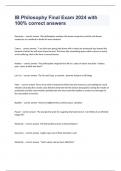
-
IB Philosophy Final Exam 2024 with 100% correct answers
- Exam (elaborations) • 8 pages • 2024
-
Available in package deal
-
- $17.49
- + learn more
Descartes - correct answer This philosopher employe the dream conjecture and the evil demon conjecture as a method to doubt his own existence Camus - correct answer "I see that man going back down with a heavy yet measured step toward the torment of which he will never know the end. That hour like a breathing-space which returns as surely as his suffering, that is the hour of consciousness Hobbes - correct answer This philosopher imagined that life in a state of nature would be "so...
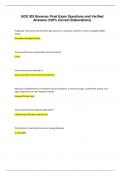
-
UGS 303 Bonevac Final Exam Questions and Verified Answers (100% Correct Elaborations)
- Exam (elaborations) • 45 pages • 2024
-
- $12.99
- + learn more
Fitzgerald: "I get to the end of all the logic about non-resistance, and there, like an excluded middle, stands the whole heritage of youth. The surrealists have a perspective closest to that of Freud Communism can be defined as state ownership of the means of production Mussolini's establishment of a National Council of Experts, a minimum wage, a retirement system, and high, progressive tax rates helped to inspire Roosevelt's New Deal The prosperity of the 1920s broug...
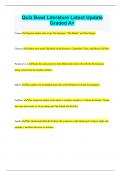
-
Quiz Bowl Literature Latest Update Graded A+
- Exam (elaborations) • 30 pages • 2024
- Available in package deal
-
- $10.49
- + learn more
Quiz Bowl Literature Latest Update Graded A+ Camus Algerian author who wrote The Stranger, "The Rebel," and The Plague. Chaucer Author who wrote The Book of the Duchess, Canterbury Tales, and House of Fame. Paradise Lost Name this epic poem by John Milton that ends with with the first humans being exiled from the Garden of Eden. Milton This author was an English poet who wrote Paradise Lost and Areopagitica. Faulkner This American author wrote about a woman's murder in "A ...
![2023 AQA A-level FRENCH 7652/2 Paper 2 Writing Question Paper & Mark scheme (Merged) June 2023 [VERIFIED] A-level FRENCH Paper 2 Writing](/docpics/4730789/65f0dfe22a1ac_4730789_121_171.jpeg)
-
2023 AQA A-level FRENCH 7652/2 Paper 2 Writing Question Paper & Mark scheme (Merged) June 2023 [VERIFIED] A-level FRENCH Paper 2 Writing
- Exam (elaborations) • 49 pages • 2024
-
- $7.99
- + learn more
2023 AQA A-level FRENCH 7652/2 Paper 2 Writing Question Paper & Mark scheme (Merged) June 2023 [VERIFIED] A-level FRENCH Paper 2 Writing Monday 19 June 2023 Morning Time allowed: 2 hours Materials For this paper you must have: • an AQA 16-page answer book. Instructions • Use black ink or black ball-point pen. • Write the information required on the front of your answer book. The Paper Reference is 7652/2. • Answer two questions. You must not answer both questions on the same...
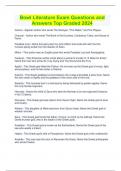
-
Bowl Literature Exam Questions and Answers Top Graded 2024
- Exam (elaborations) • 13 pages • 2024
-
Available in package deal
-
- $11.49
- + learn more
Camus - Algerian author who wrote The Stranger, "The Rebel," and The Plague. Chaucer - Author who wrote The Book of the Duchess, Canterbury Tales, and House of Fame. Paradise Lost - Name this epic poem by John Milton that ends with with the first humans being exiled from the Garden of Eden. Milton - This author was an English poet who wrote Paradise Lost and Areopagitica. Faulkner - This American author wrote about a woman's murder in "A Rose for Emily." Name this man who wrote ...
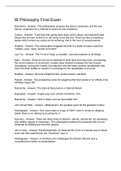
-
IB Philosophy Final Exam
- Other • 6 pages • 2023
-
- $10.79
- + learn more
Descartes - Answer- This philosopher employe the dream conjecture and the evil demon conjecture as a method to doubt his own existence Camus - Answer- "I see that man going back down with a heavy yet measured step toward the torment of which he will never know the end. That hour like a breathing-space which returns as surely as his suffering, that is the hour of consciousness Hobbes - Answer- This philosopher imagined that life in a state of nature would be "solitary, poor, nasty, brutis...

$6.50 for your textbook summary multiplied by 100 fellow students... Do the math: that's a lot of money! Don't be a thief of your own wallet and start uploading yours now. Discover all about earning on Stuvia


